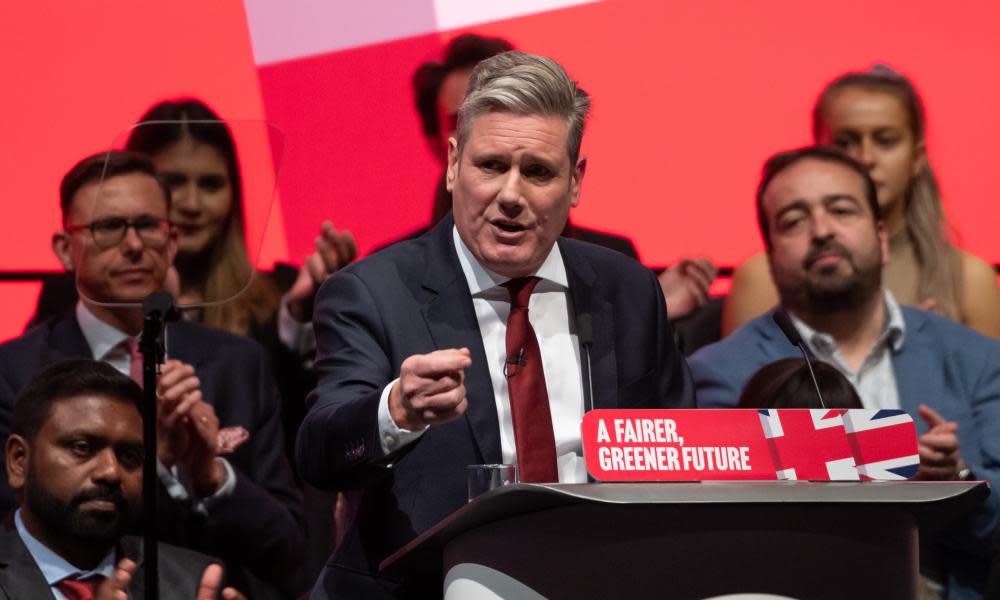Labour’s low-carbon plans look like sensible economic policy

A publicly owned energy company, insulation for every British home, carbon-free power by the end of the decade – the Labour conference showed Keir Starmer putting a low-carbon future firmly at the centre of his economic plans.
Crucially, however, these announcements were not just green in intent – they are mainly aimed at tackling the soaring cost of living, and at “levelling up” the UK’s regions. With the world in the grip of a gas crisis while renewable energy has tumbled in price, the real costs of fossil fuel addiction are increasingly clear, and a low-carbon energy system looks the economic choice.
The Labour leader’s proposals would create a new Great British Energy company to kickstart investment in renewable power generation by providing funds for new projects and helping to remove some of the existing barriers to wind and solar deployment. It would not involve nationalising any existing energy company, however, as some in the party have called for.
Labour’s plans also include:
A £60bn plan to insulate 19 million UK homes over the next decade, permanently saving about £1,000 per household on energy bills, set out by Ed Miliband.
Boosting fledgling “green” hydrogen technology, through the national wealth fund set out by the shadow chancellor, Rachel Reeves.
Electric vehicle development, also through the national wealth fund.
Adopting green steel technology, to reduce carbon emissions and end reliance on fossil fuels.
Moves to decarbonise the UK’s heavy industry.
Plaudits came from both unions and business. Frances O’Grady, the general secretary of the TUC, called the new energy company “a big, bold move that will cut bills and secure our energy future. This new national energy champion can provide high-quality jobs to every corner of the UK. And it’s about time the public shared in the profits of British energy.”
Brian McBride, president of the CBI employers’ organisation, called for more detail on the plans for energy market reform, but welcomed the move: “Where Great British Energy could add value is by channelling catalytic public investment to spur innovation, and accelerating the delivery of renewable projects.”
Some of the proposals are still promises rather than fully fledged plans, pointed out Polly Billington, chief executive of the UK100 group of local government leaders. “The cheapest energy is the energy we don’t use, but this has been overlooked time and again,” she said. “To avoid another winter like this one, where millions are expected to fall into fuel poverty, we need an energy efficiency revolution. If the Labour party is to deliver on its energy promises, it’s time to end the wait and insulate.”
Labour’s targets closely match the advice given by energy economists: go for energy efficiency as a top priority; ramp up renewable energy generation; windfall taxes on energy companies; offer people alternatives to petrol-guzzling cars; and invest in up-and-coming technologies such as hydrogen and green industry.
Insulation is the most urgent. One in every three pounds that the average household in the UK spends on heating is wasted, as Britons live in the draughtiest, leakiest housing stock in western Europe. Insulation rates fell sharply in the early years of the coalition government, and never recovered. A single attempt under Boris Johnson to revive home insulation, the green homes grant, was botched in administration and swiftly abandoned, and for the last 18 months – including the biggest energy crisis for decades – there has been no nationwide insulation scheme for average households.
Ending fossil fuels also means ending fossil fuel jobs, and those workers need a “just transition” to green jobs, added Rebecca Newsom, head of politics at Greenpeace UK. “To be truly effective, and deliver on Labour’s commitment to a fair climate transition, a publicly owned energy agency would need to give fossil fuel workers smooth routes into the clean energy sector,” she said. “Right now we already know that more renewable jobs must go to local workers, with fair contracts and safe working conditions, and there must be proper training and reskilling for workers moving across from the oil and gas industry.”

 Yahoo Movies
Yahoo Movies 
